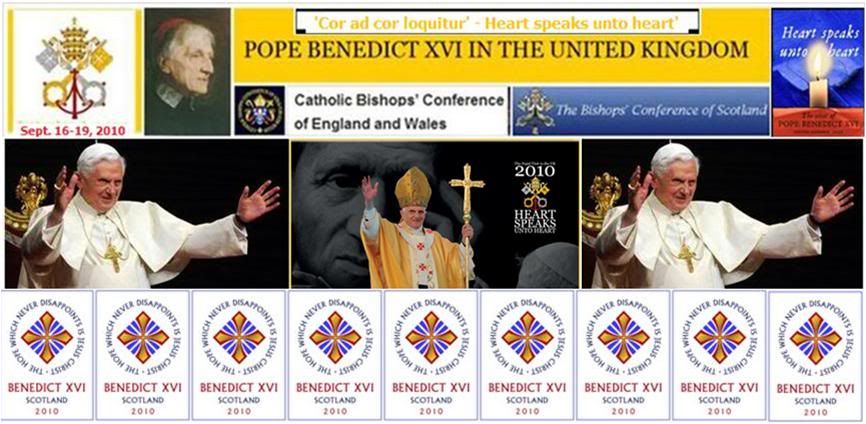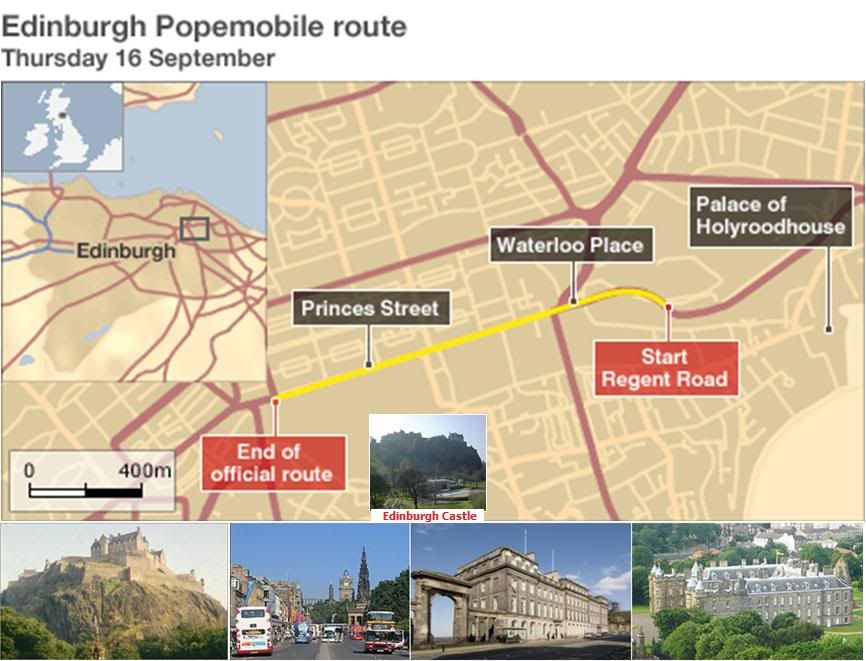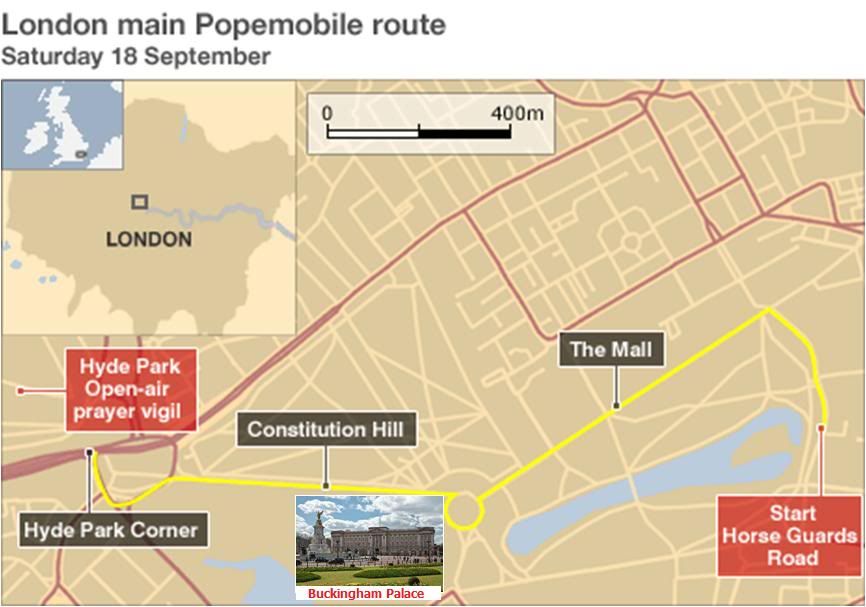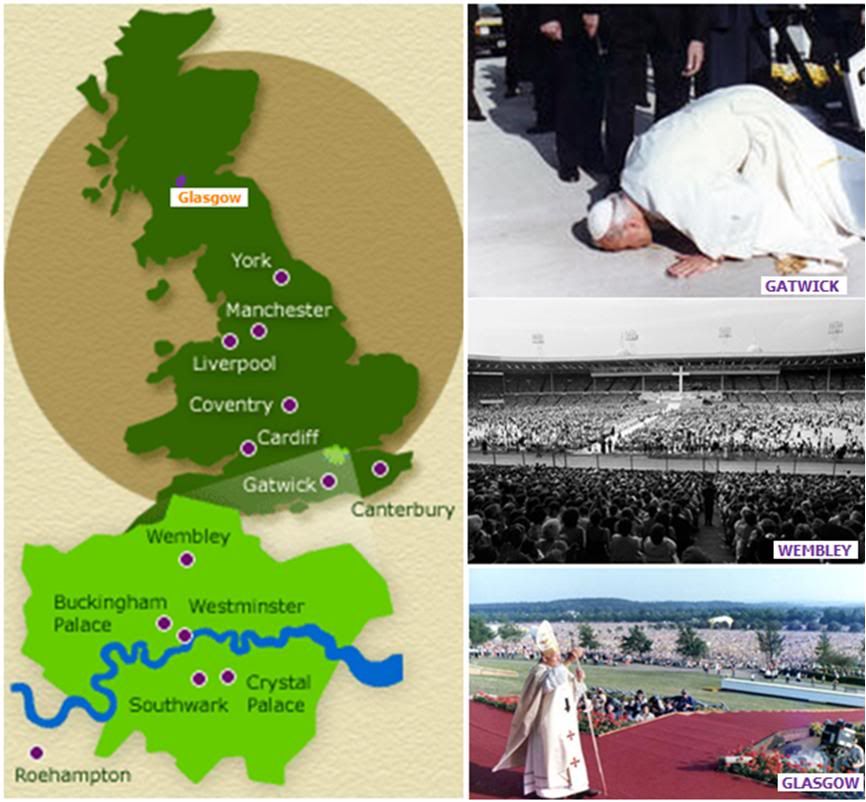 The BBC has posted quite a number of stories on the papal visit in the past two days but has not seen fit to create a special section for it, so I've cobbled together a sort of banner for the Beeb's features between now and Sept. 19 from some of the elements in the stories they have posted.
The BBC has posted quite a number of stories on the papal visit in the past two days but has not seen fit to create a special section for it, so I've cobbled together a sort of banner for the Beeb's features between now and Sept. 19 from some of the elements in the stories they have posted.
 First, a good overview of the visit:
The Pope's visit
First, a good overview of the visit:
The Pope's visit
at a glance
Sept. 8, 2010
Pope Benedict will arrive in the UK on 16 September for a four-day visit - the first official trip by a serving pontiff since 1982.
There will be three main events - in Glasgow, London and Birmingham - but these will only be open to people who are part of a group from a Catholic parish and have already obtained tickets.
Anyone else hoping to see the Pope in the flesh will have to join the crowds on the streets of Edinburgh and Westminster when he travels through in the Popemobile.
Several events will be televised and will also be streamed live on the official Papal visit website.
THURSDAY 16 SEPTEMBER
SCOTLAND
1030 BST: Pope's Benedict's flight from Rome's Ciampino airport due to land in Edinburgh.
1100 BST: The Pope will be welcomed by the Queen and other members of the Royal Family at Holyrood House. The city council says the public will not be able to view him on his journey from the airport to the palace.

1230 BST: He will take part in the St Ninian's Day Parade through Edinburgh in the Popemobile, travelling from Regent Road and along Princes Street.
Tens of thousands of people, including invited school and community groups, are expected to line the route. Road closures will be in place in the area and some bus services will be suspended during the parade.
Events in Edinburgh will be televised live on the BBC.
1730 BST: Open-air mass at Bellahouston Park in Glasgow - the largest organised event of the trip. An invited audience of up to 100,000 people is expected to attend the event, which organisers say will cost up to £1.5m to put on. Each pilgrim has been encouraged to give a contribution of £20.
The Mass will take place in the southern section of the park, in the area facing Mosspark Boulevard. Entry for those attending begins at 1000 BST.
Before the service begins, Britain's Got Talent star Susan Boyle will sing the hymn How Great Thou Art, as well as her signature song, I Dreamed A Dream. She will sing again as Pope Benedict leaves the park after the Mass. Michelle McManus, winner of Pop Idol 2003, will also sing during the pre-Mass programme, and an 800-strong choir will sing during the service.
2000 BST: The Pope leaves Glasgow airport bound for Heathrow, due to arrive at 2115 BST.
FRIDAY 17 SEPTEMBER
LONDON
Morning: The Pope will visit St Mary's University College, Twickenham, which was founded in 1850 by the Catholic Poor Schools Committee.
As well as several private meetings, he will be greeted by some 3,000 school children and students to celebrate Catholic education - an event which will be broadcast live on the internet - and will inaugurate the John Paul II Institute for Sport at the college.
1600 BST: The Pope will meet the Archbishop of Canterbury at Lambeth Palace in central London.
1710 BST: Later, he will address an invited audience at Westminster Hall.
En route to that address, the pontiff will travel from Lambeth Bridge to Millbank in the Popemobile, but the Metropolitan Police say there will be "limited space and vantage points available" to view this procession. Instead, they are advising those who wish to see the Pope to do so the following day as he travels to Hyde Park.
1815 BST: The Pope will join the Archbishop of Canterbury and other Christian leaders at Westminster Abbey for Evening Prayer. An invited congregation of 2,000 will hear the service. Pope Benedict will also pray at the Grave of the Unknown Warrior and at the Shrine of St Edward the Confessor.
SATURDAY 18 SEPTEMBER
LONDON
1000 BST: The Pope will celebrate Mass in Westminster Cathedral, and will also, from there, greet the people of Wales. According to a Church spokesman: "Sadly, the Pope can't go to Wales because of the pressures of time."
Afterwards he will greet and bless an invited crowd of 2,500 young people in the Cathedral Piazza outside. They will include a representative from every parish in England and Wales, a contingent from Scotland, and a number of volunteers from Catholic youth organisations.
1700 BST: The Pope will visit St Peter's residential home for elderly people in Vauxhall. The Metropolitan Police say this and other pastoral visits are private and by invitation only through the Church.
"The public should not head for these events as there will be no opportunity for them to see the Pope," it said in a statement. "Some of these venues are in built-up residential areas which are not suitable for large numbers of people to descend on at any one time."
1815: About 80,000 people are expected to attend an open-air vigil in Hyde Park. The vigil itself will be for those with pre-arranged tickets only, but before it begins there will be a Popemobile procession along Horse Guards Road, The Mall and Constitution Hill to Hyde Park Corner and then Hyde Park itself.


The Met is advising people wishing to view the motorcade to plan their journeys well in advance to avoid disappointment. Extra trains are being put on to and from the capital, but are expected to be very busy.
SUNDAY 19 SEPTEMBER
BIRMINGHAM
0845 BST: The Pope will leave his accommodation in Wimbledon and fly by helicopter to Birmingham.
1000 BST: An invited audience of 65,000 will watch as the Pope's beatification of Cardinal John Henry Newman takes place in Cofton Park. Extra trains will be put on, although most pilgrims are expected to arrive in coaches from their parishes.
The venue will open at 0200 BST with morning worship at 0810 BST. The beatification mass itself will continue until approximately 1200 BST.
Birmingham Council says those without a ticket are "advised to avoid the area around the park on Sunday 19 September" and watch the event on television instead. It is expected to be broadcast on BBC2 and BBC Radio 4.
The council says there are
no plans to screen the Mass in any public spaces in or around the city [WHY NOT????], although parishes are being encouraged to organise their own screenings in community halls.
Afternoon: Following a lunch, the Papal visit will conclude with a private meeting between the Pope and the bishops of England, Scotland and Wales in Oscott College.
1815 BST: Following a short ceremony at Birmingham airport, the Pope will depart for Rome.
Apropos, the official papal visit site gives a bit more detail about the Popemobile routes:
 Popemobile guide
Thursday 16 September, Edinburgh
Popemobile guide
Thursday 16 September, Edinburgh
At around 12.30 pm the Pope will travel in the popemobile from Holyrood Palace along Abbeyhill, Regent Road, Princes Street, Lothian Road, Tollcross and Morningside to Cardinal Keith O’Brien’s official residence.
Friday 17 September, London
At around 17:00 the Pope will travel in the popemobile from Lambeth Palace across Lambeth Bridge and along Millbank, the Pope arrives at the Palace of Westminster at around 17:15. There will be limited space along this route and limited vantage points from which to see the Pope.
Saturday 18 September, London
At 18:00 the Pope will travel in the popemobile along Horse Guards Road, The Mall, Constitution Hill and Hyde Park Corner before arriving at Hyde Park for the Prayer Vigil at around 18:30.
The Metropolitan Police said:
“While security issues will be paramount, the Met Police is working with HM Government, event organisers and other partners to ensure routes for the popemobile are designed with the aim of affording the public the best possible opportunity of seeing Pope Benedict. Those wishing to see the Pope are advised to plan their trips well in advance and head for the central London Popemobile routes to avoid disappointment.”

 An acknowledgment of the Pope's pre-visit message at the GA today
An acknowledgment of the Pope's pre-visit message at the GA today:
Pope Benedict XVI blesses
UK population ahead of visit
Sept. 8, 2010
Pope Benedict XVI has blessed the people of the UK ahead of his visit to Scotland and England next week.
The Pope gave thanks for the work that has been carried out to make his visit a success and said he was "very much looking forward" to his four-day trip.
Speaking from Rome, he sent his "heartfelt greetings" to Britain.
Secular groups have been angered by the visit. Earlier, the Protest the Pope campaign promised not to disrupt the visit with their demonstrations.
The Pope is to arrive on 16 September, the first papal visit since 1982.
The Pope said: "I am aware that a vast amount of work has gone into the preparations for the visit... and I want to say how much I appreciate the efforts that have been made to ensure that the various events planned will be truly joyful celebrations."
The Pope acknowledged that the preparations were not just the work of the Church and also thanked "the government, the local authorities in Scotland, London and Birmingham, the communications media and the security services".
"Above all I thank the countless people who have been praying for the success of the visit and for a great outpouring of God's grace upon the Church and the people of your nation."
The Pope is due to begin his visit in Edinburgh where he will be received by the Queen before celebrating Mass at Bellahouston Park in Glasgow.
He will spend two days in London, where he is due to meet with the Archbishop of Canterbury Dr Rowan Williams, give an address at Westminster Hall and hold a prayer vigil in Hyde Park.
On Sunday 19 September, the Pope will beatify Cardinal John Henry Newman at Cofton Park, Birmingham.
The blessing will bring the revered 19th Century clergyman one step closer to sainthood.
But the visit has also triggered controversy.
Earlier, leaders of the Protest the Pope campaign spoke to the Archbishop of Southwark, the Most Rev Peter Smith, at Scotland Yard amid concerns the pontiff's visit could be disrupted.
In a statement after the meeting, the Most Rev Smith said he had been given a "very clear assurance" the campaigners have "no intention" of disrupting any of the events.
"We had an open and frank discussion on the issues of child abuse, homosexuality and the status of Pope Benedict's visit as a state visit," he said.
Many people are also criticising the fact that the visit will be substantially funded by the taxpayer.
Some 77% of Britons think taxpayers should not help pay for the visit, a survey has suggested.
The online poll of 2,005 adults issued by think tank Theos also found 79% had "no personal interest" in his visit.
The cost to UK taxpayers, previously estimated at £8m, could rise to between £10m and £12m.
The Catholic Church is also expected to make a contribution of between £9m and £10m towards the costs, which does not include an expected multi-million pound bill for policing the visit.
It will be the first papal visit since Pope John Paul II's 1982 trip.
 And the inevitable comparison game, with an obvious 'erroneous' headline because one visit has yet to take place!
The UK visits of Benedict XVI
And the inevitable comparison game, with an obvious 'erroneous' headline because one visit has yet to take place!
The UK visits of Benedict XVI
and John Paul II compared
By Michael Hirst
Sept. 8, 2010
Pope Benedict XVI will next week become the first head of the Catholic Church to pay a state visit to the UK.
Much has changed since Pope John Paul II toured the UK - on a pastoral visit - in 1982, and the forthcoming trip has not been short of controversy. How do the two compare?
The men
During his four-day visit, Pope Benedict will meet the Queen, politicians and religious leaders, deliver a dozen speeches or homilies, preside at public Masses in Glasgow, Birmingham and London, and a prayer service in Hyde Park.
But this visit is expected to be a lower-key affair than that of his predecessor. Dubbed "the rock star Pope", John Paul II was handsome and charismatic, known for theatrical flourishes such as kissing the ground when he got off his plane.
 Left, John Paul II's itinerary on his 1982 visit (May 28-June 2). Photos at right, from top to bottom: Arriving in Gatwick airport; Mass at Wembley Stadium, London; Mass at Bellahouston Park, Glasgow.
Left, John Paul II's itinerary on his 1982 visit (May 28-June 2). Photos at right, from top to bottom: Arriving in Gatwick airport; Mass at Wembley Stadium, London; Mass at Bellahouston Park, Glasgow.
Some said the Polish Pope's UK visit - the first by the head of the Catholic Church - was the biggest event for British Catholics since emancipation in the 1820s.
He was hailed as a hero in the battle against communism, and during his six-day tour of England, Scotland and Wales, nearly 2m people flocked to see him at venues including London's Wembley Stadium, Glasgow's Bellahouston Park and Cardiff's Ninian Park.
Benedict XVI - who is two decades older than his predecessor when he visited - is quieter and more scholarly by comparison.
He gained a reputation as an enforcer in his previous role as John Paul II's doctrinal chief, and is as unbending as his predecessor on issues such as condoms, women priests, and priestly celibacy.
The Church
At the time of John Paul II's visit,
Catholicism was still enjoying a resurgence following the reforms of the Second Vatican Council in the 1960s.
[A liberal myth. The church was never more in doctrinal, liturgical and disciplinary chaos. These were also the years when the pedophilia affliction was peaking, which all the retrospective articles today about the 1982 papal visit completely ignore. But then even at the floodtide of their obsessive reporting on 'pedophile priests', they preferred to blur the timelines and leave the impression that all the cases emerging were fairly recent instead of going back decades to the 1970s-1980s (even the 1960s), the better to associate them with Cardinal Ratzinger whose CDF was not given authority to investigate sex abuse cases until 2001.]
More recently, though, the Church in the UK, as elsewhere, has been mired in scandals over its handling of clerical sex abuse ['More recently though' - there you go! implying outright that the 'scandals' are of recent origin instead of dating back to those years that the MSM now see through falsely-tinted lenses],and its positions on such issues as contraception, abortion, IVF treatment and stem cell research.
Although there were protests against the 1982 visit, this year the umbrella group Protest The Pope has united secular, gay, feminist and other activist groups in a co-ordinated campaign.
The visit
Weeks before John Paul II arrived in Britain, strongly Catholic Argentina invaded the Falkland Islands, and Britain dispatched a military task force to the South Atlantic.
The Pope's trip was nearly cancelled as a result, but went ahead on the basis that he would not meet Prime Minister Margaret Thatcher.
As Pope Benedict's is a state visit, he will meet Prime Minister David Cameron, who is expected to host a state banquet in his honour - though the Pope himself may not attend
[Surely, the reporter could have researched that Popes never attend any public dinners, and that even the luncheons they attend, usually with bishops of the host area, are private affairs!], to allow himself time to rest. The trip has been organised by UK bishops in conjunction with government departments.
John Paul II's trip cost around £7m (the equivalent of about £20m today). It was organised - and largely funded - by the Church, which offered free access to papal events.
Benedict XVI's trip is more governed by diplomatic protocol. The government will foot the £10m bill for non-religious elements, which has irked secularist groups.
In a nation still reeling from the global financial crisis, there has been criticism of the high cost of providing security.
Meanwhile, some Catholics have been put off by ticket prices of up to £25 for papal events. Last month, it was reported thousands of tickets were being returned.
There have also been concerns over payment of the Church's share. It is thought to have raised about £5m of an estimated £9m required so far.
Catholic figures have complained about "draconian" security measures being imposed by government officials, while questions have been asked about the Church's organising skills.
Birmingham's Cofton Park was only recently confirmed as the venue for the trip's centre-piece - the beatification of Cardinal Newman - which many, including Church officials, had assumed would happen at the much larger Coventry Airport.
The message
John Paul II's speeches during his visit were written after consultation with British clerics - including the current Archbishop of Westminster, Vincent Nichols. They were easily accessible and largely well-received.
Pope Benedict drew huge crowds during a 2008 visit to New York His visit resulted in a rise in UK church attendance, which organisers put down to well-attended, high-profile events which had high-quality liturgies and a positive message that promoted Christian unity.
Vatican watchers suggest the Pope will be
less concerned about crowd-pleasing on this trip than on emphasising Catholic values.
[When was he ever more concerned about crowd-pleasing' any way????]
"The current Pope wants a leaner Church of true believers," said Robert Mickens, Vatican correspondent for
The Tablet, a Catholic newspaper.
"He doesn't feel obliged to explain anything he does." [Shows you how the Tablet writers live in liberal la-la land where they are free to make up 'facts' as they please! Imagine saying about Benedict XVI, Of all people, that he does not feel obliged to explain anything he does! Besides, the Church ideally should be made up of true believers, which, in the context of what Christ's one Church is, does not at all imply the blind fanaticism the term generally does.]
But his 16 foreign trips as Pope have been
largely successful, drawing huge crowds in New York and even Australia. [How condescending! but at least, the writer assigns a degree of 'success' to Benedict's trips.]
The public
When John Paul II visited, there were around 4.2m UK Catholics (almost 9% of the population) and traditional strongholds were white, Irish, working class, urban areas.
Nearly 2m people flocked to see John Paul II during his 1982 visit to the UK.
[Which, it must be mentioned, lasted eight days and took him to 6 cities.]
A 2009 Ipsos Mori poll suggested there were 5.2m Catholics in England and Wales; there are thought to be around 800,000 in Scotland.
This increase has been put down to an influx of immigrants from Eastern Europe, Africa and Asia, with urban churches in particular benefiting.
But polls suggest only a quarter of Catholics regularly attend Sunday Mass. Some churches have closed owing to spending cuts.
The media
Pope John Paul II visited the UK before the days of the internet, 24-hour rolling news, and budget travel. As such, he had a mystique that helped pull in the crowds.
This time wall-to-wall coverage is available of the tour, which will be live-streamed from the visit's official website.
Many may be tempted to follow the Pope's progress from the comfort of their homes, rather than braving the UK's elements for a glimpse of the Catholic leader.
[What Hirst leaves out in this part of the article is the kind of coverage provided John Paul before, during and after the visit. I don't have the time to do the research myself, even if articles from 1982 are online.]
[Modificato da TERESA BENEDETTA 09/09/2010 17:54]